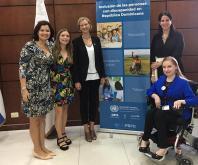"Sometimes, after hearing comments such as 'you are not able to', 'how are you going to do it?' and 'why?', I have felt less capable and have doubted what I can achieve," shares Olga Altman. "But I always had the dream to live an independent life, discover my potential and contribute to making society fairer and more inclusive for all communities in vulnerable situations." Olga serves as a UN Volunteer for Inclusion, Innovation and the 2030 Agenda with the United Nations Development Programme (UNDP) in the Dominican Republic. She is one of 15 UN Volunteers serving through the UNDP/UNV Talent Programme for Young Professionals with Disabilities. Her assignment is part of a project supported by the Federal Ministry for Economic Cooperation and Development (BMZ) of Germany.
Olga acquired her physical-motor disability at the age of 13 due to muscular dystrophy, and since then, her wheelchair has become her ally. She has had to face social, attitudinal, architectural, and transport barriers that at certain times have hindered her full development and participation in social activities. All these challenges make her think that disability is not so much in the person but in the obstacles interfering with its independence and ability to function in society.
In the Dominican Republic, 1,160,847 people live with some type of disability, that represents, approximately 12 per cent of the population. About 70 per cent of the Dominican population is considered poor or vulnerable, which evidences that disability is both a cause and a consequence of poverty. Of the people with disabilities, 64 per cent do not have access to decent work. This violates a person's sense of independence and generates higher expenses for the family.
The greatest hope for people with disabilities comes with the 2030 Agenda for Sustainable Development, which includes them directly by explicitly mentioning them 22 times (in the declaration, goals and indicators). This shows that the principles of universality can only be fulfilled if people with disabilities are considered, and no one will be left behind.
Olga studied psychology and advocated for the rights of people with disabilities in different organizations. These experiences also helped her to achieve one of her most significant professional accomplishments, which was working for the United Nations, as part of the UNDP-UNV Talent Programme for Young Professionals with Disabilities.
"Labor inclusion has meant greater independence, self-improvement, personal growth, productivity, motivation, inspiration, capacity development, allowing me to be able to contribute to my family and society," Olga shares. "However, it was a challenge, both for myself and the organization; we had to adapt to each other. But with reasonable adjustments (an adaptation of the desk to the necessary height, placement of access ramps, transport management and assistance) and the needed support, I have been able to discharge my functions fully."
Today, Olga serves with an interagency initiative of UNDP, the UN Children's Fund (UNICEF) and World Health Organization (PAHO/WHO). The project "Building national capacities for achieving social inclusion of persons with disabilities in the areas of education, employment, and participation in the Dominican Republic" supports capacity development as a driver of change. It aims to promote a human rights approach to catering for the needs of children with disabilities outside the education system and of persons with disabilities who experience discrimination in the labour market and are socially stigmatized due to their disability.
I love my work and feeling that I am valued for what I can do. This feeling drives me more and more to fight against the prejudices and taboos that persist in society about the unfounded belief that people with a disability condition cannot receive education, work, cannot have a partner, or worse, cannot lead a normal life like other members of the community. Raising awareness, breaking stereotypes, respecting differences will help us grow as people and help us foster a culture of peace and respect, and thus achieve a more just and inclusive society, to stop judging by appearances and value the talents people possess, regardless of their condition. --Olga Altman
The United Nations recently approved the Disability Inclusion Strategy (UNDIS), which provides a framework and creates the basis for the inclusion of persons with disabilities in the work of the UN system and beyond. This effort will allow more people like Olga to develop their extraordinary talents and demonstrate that everything is possible. At the same time, the UN will model inclusion and support inclusive societies, where no-one is left behind.

